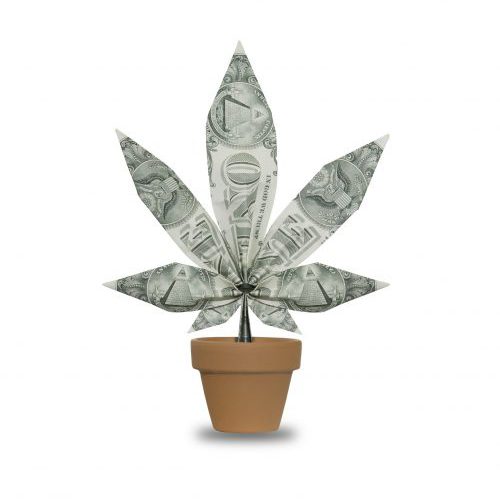Companies and Brands
Marijuana News Roundup: Biggest US Banks Are in the Cannabis Business

Published:
Last Updated:

One of the biggest issues facing cannabis businesses in states with legalized marijuana is their inability to find a bank willing to handle their money. Because marijuana remains illegal under federal law, many banks have refused to open accounts for businesses in the cannabis industry.
At least that’s what the banks say. What they do, however, may be altogether different. The country’s four biggest banks — Bank of America Corp. (NYSE: BAC), Citigroup Inc. (NYSE: C), JPMorgan Chase & Co. (NYSE: JPM), and Wells Fargo & Co. (NYSE: WFC) — all declared in 2015 that they did not provided banking services to marijuana related businesses.
According to study conducted on behalf of “American Banker,” out of 84 applicants to operate medical marijuana dispensaries in Massachusetts filed between June 2015 and September 2016, 29 of the businesses claimed they had accounts at one of the four big banks or one of the banks’ subsidiaries. Of that total, 17 had a connection to BofA.
The accepted wisdom is that big banks do not do business with cannabis businesses, but at least in a relatively small number of cases that appears not to be the case. What will happen under a Trump administration remains to be seen, but Attorney General nominee Jeff Sessions has been clear that he will enforce federal law.
For more details on the banking study, see the American Banker website.
People in the US and Canada Spent Over $53 Billion on Marijuana in 2016
People in North America spent $53.3 billion on legal, medical, and illicit marijuana in 2016. That’s more cash than Americans blow in a year at McDonald’s and Starbucks combined.
According to a new report from Arcview Market Research, a leading publisher of marijuana market research, the black market is losing ground to its legal counterpart as consumers spend more money each year on legal cannabis. Progress is slow, however.
The North American legal weed market posted $6.7 billion in revenue in 2016, up 30% from the year before. The illicit market generated 87% of total pot sales, down from 90% in 2015.
The numbers suggest the legal marijuana industry is growing quickly, but it has a ways to go before it topples the black market, which has the lion’s share of revenue.
Read more at Business Insider.
Marijuana Taxes Collected Continue to Decline
Sales of recreational marijuana in Oregon continued to plummet in December, figures from the Oregon Department of Revenue show.
Taxes collected on sales totaled $5.6 million in December, a 13 percent decline from November and a 28 percent drop from the peak of $7.8 million in October.
For the year, tax collections totaled $60 million, a sizable boost above the $45 million expected by state officials at the beginning of the year.
Marijuana retailers have said in recent months that demand remains strong for their products, but sales have suffered because of tight supplies. Questions about pesticide use and changes in the permitting of retailers combined to decrease availability.
Read more at the Statesman Journal.
Consequences of Veteran Marijuana
Substance use disorder (SUD) has risen with veterans using medical marijuana for post-traumatic stress disorder (PTSD) in the past fiscal years.
From 2002 to 2014, the use of marijuana has risen 22.7 percent in veteran community, according to Veterans Affairs (VA).
As of 2014, 40 thousand veterans with both SUD and PTSD were diagnosed with cannabis use disorder, according to VA.
According to Dr. Smith, there are problems associated with the use of medical marijuana.
“Physical dependence is a state that develops as result as tolerance or adaptation from the result of use of the drug disrupting the body’s biochemical [balance],” said Smith.
“Marijuana use by individuals with PTSD may lead to negative consequences such as marijuana tolerance,” according to VA.
“You can develop a tolerance to the euphoric effect,” said Smith.
Read more at Coyote Chronicle.
Marijuana Shops Are Trying to Look Like the Apple Store
On a bustling stretch of Santa Monica Boulevard lined by vintage stores and eateries, the MedMen shop looks right at home.
Sunlight streams in through the store’s floor-to-ceiling windows. Inside, salespeople in bright red T-shirts greet shoppers. Merchandise is carefully arranged on sleek wooden tables lined with iPads.
It’s a retail scene reminiscent of an Apple store, but the high-tech gadgets on sale are vape pens.
After years of bullet-proof glass and burglar bars, marijuana shops are starting to get a makeover.
Cannabis entrepreneurs, borrowing from successful retailers such as Apple and Whole Foods, are opening dispensaries with natural light, spacious displays and open-floor plans. With weed now legal for recreational use in California and seven other states, such amenities could attract an anticipated glut of new customers who are less familiar with cannabis and may be put off by the industry’s generally dingy shopping experience.
Read more at the Los Angeles Times.
Want retirement to come a few years earlier than you’d planned? Or are you ready to retire now, but want an extra set of eyes on your finances?
Now you can speak with up to 3 financial experts in your area for FREE. By simply clicking here you can begin to match with financial professionals who can help you build your plan to retire early. And the best part? The first conversation with them is free.
Click here to match with up to 3 financial pros who would be excited to help you make financial decisions.
Thank you for reading! Have some feedback for us?
Contact the 24/7 Wall St. editorial team.